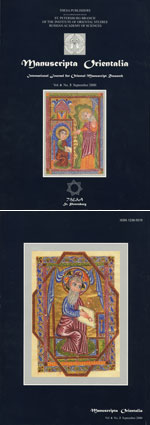|
|
| |

|

|
Rezvan E. [Review:] A. I. Kolesnikov. Denezhnoe khoziaistvo v Irane v VIII veke (The Monetary Economy in the 7th Century Iran). Moscow: Vostochnaia literatura Publishing House, 1998, 416 pp.+ 16 pp. inserts. // Manuscripta Orientalia. Vol. 6. No. 3. September 2000. P. 72.
This monograph deals with the economic history of
Iran under the late Sasanids (590–651) and the first
Muslim rulers, the proteges and opponents of the
Umayyads (second half of the seventh – beginning of the
eighth century), in the context of the era’s stormy political
events and ideological and social factors. Coins served as
the main source for this work: late-Sasanian drachmas
(more than I 0.000 items), Arab-Sasanian drachmas (more
than 2.000 items). and copper coins of varied administrative
and confessional origin (around 600 items) minted between
the end of the sixth century and the 1rid-eighth century. In
order to recreate the conditions in which the monetary
economy functioned. the author employs Sasanian
epigraphies. Muslim historical chronicles. geographic treatises
in Middle Persian. Arabic. and New Persian, and
Syriac sources. A significant number of the coins studied
by the author were held for many years in the collection of
the Asiatic Museum (today the St. Petersburg Branch of
the Institute of Oriental Studies. Russian Academy of
Sciences): it was only in 1930–31 that they were transferred
to the State Hermitage.
The monograph treats the key problems which surround
the structure and nature of the monetary economy in late-Sasanian and early Islamic Iran. These include a) the
total number of active mints (the attribution and localization
of centres for minting silver and copper, their actual
number, and the length and intensity of their activities at
various times); b) the basic production of mints — silver
drachmas and copper coins (the evolution of monetary
units, rate of emissions under actual conditions, sums of
silver minting. and role of religious factors in determining
the graphic appearance of coins); c) the central and local
authorities which sanctioned the activities of minting
centers. The analysis of numismatic material is buttressed
by synoptical tables and illustrations.
An appendix includes a catalogue of Arab-Sasanian
coins at the State Hermitage (St. Petersburg) illustrated
with photographs of rare coins. The catalogue is of independent
scholarly interest for medieval historians and numismatics
specialists.
A. I. Kolesnikov’s work differs from that of his predecessors
in its far-ranging approach to the questions at hand,
its use of a significantly more diverse group of sources, and
the additional numismatic material from the collections of
the Hermitage, the State Historical Museum (Moscow), and
museums in Georgia, Armenia, and Azerbaijan. The work
sums up many years' of research by the author in this field.
К содержанию выпуска...
 PDF-файлы PDF-файлы
Полный текст статьи
Ключевые слова
история Ирана
Сасаниды
|
|
|
|
Случайная новость: Объявления |
|
22–24 апреля 2024 г. в ИВР РАН пройдет Третья Международная научная конференция «Рукописное наследие Востока», посвященная 140-летию со дня рождения Б.Я. Владимирцова (1884–1931). Предлагаем вашему вниманию программу. |
|
Подробнее...
|
|
|
|
|

